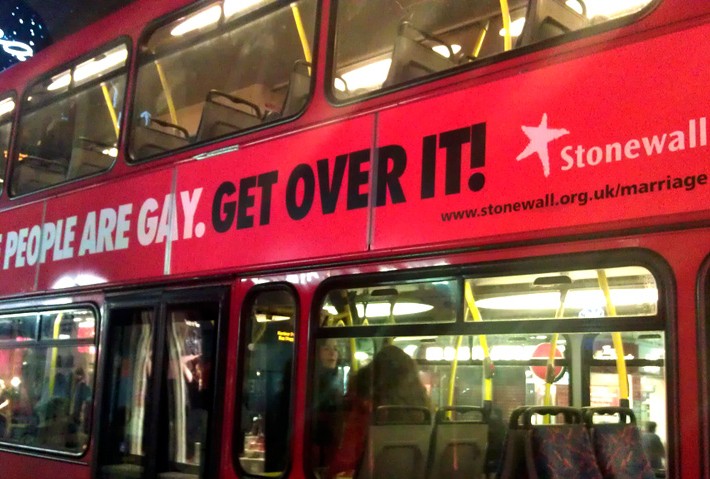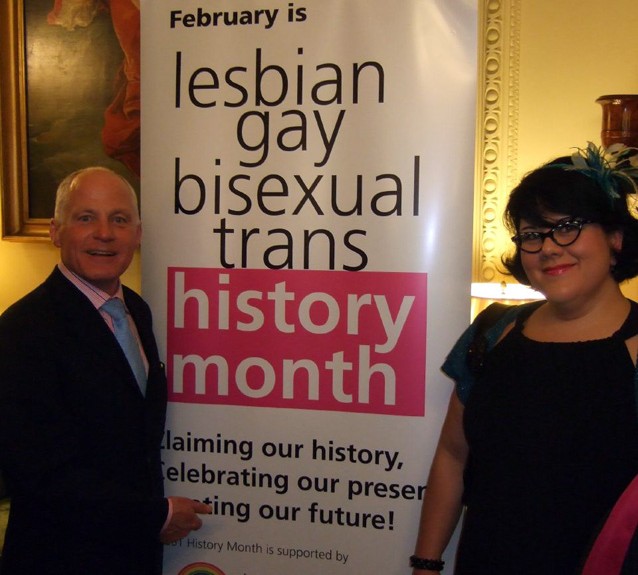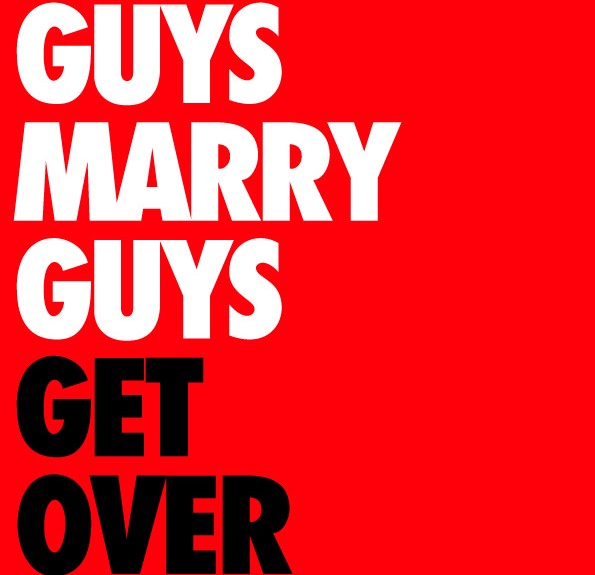LGBT History Month 2014
Lesbian, Gay, Bi-Sexual and Trans-sexual History Month 2014.
Lesbian, Gay, Bisexual and Trans-sexual (LGBT) communities have always been a valuable part of British and world-wide society. This is reiterated by the LGBT History Month website comment “We are lesbian, gay, bisexual and trans-[sexual/gender] people. We are actors, artists, bricklayers, bookies, cab drivers, cooks and clowns”. A Guardian newspaper reporter further comments “many lesbian, gay, bisexual and transgender people have made huge contributions to science, maths and engineering.” Why then were same-sex acts illegal until 1967? Why is gay marriage only just becoming legal? And how come there are still some stereotypes of LGBT representation on Televison? These are just some examples of the things to think about when considering LGBT communities in British society.
 Transit ad by Stonewall in London, UK. Launched in Summer of 2011. Photo by Duane Brown
Transit ad by Stonewall in London, UK. Launched in Summer of 2011. Photo by Duane Brown
In 2014 though it is unfortunately true that LGBT people prefer to keep a low profile for fear of negative repercussions (LGBT History Month website), there are groups and events that support LGBT communities. This is actually the subject of this blog; to inform readers about LGBT History Month which currently occurs annually in February, as it has done for the past 8 years.
LGBT History Month originally came from America, popularised in the UK by Sue Sanders in February 2005 just after the abandonment of Section 28. Section 28 had the socially-regressive aim of preventing any discussion about LGBT sexualities or their issues. LGBT History Month’s primary purpose was to cause LGBT groups to become more prominent and to stamp out homophobia from British society.
Homophobia : “an extreme and irrational aversion to homosexuality and homosexual people.”
(Oxford Dictionary)
It is undoubtedly good news then that British politics has responded positively to LGBT History Month. After the month was originally supported by Jacqui Smith and Gordon Brown, current Prime Minister David Cameron continues support through saying LGBT history month “has helped to celebrate the LGB and T community and focus on areas where there needs to be more work done on equality”.
Similarly, Labour Leader Ed Miliband said “the principles behind LGBT History Month reflect the kind of society we would all like to see”. Other support for LGBT History Month has come from the Metropolitan Police, Southwark Council and the gay actor Sir Ian McKellen.
 Downing Street Gordon Brown Holds a reception for LGBT History Month. (March 6th 2009).
Downing Street Gordon Brown Holds a reception for LGBT History Month. (March 6th 2009).
When LGBT History Month was initially introduced there were around 150 UK-wide events for it. The months events are currently based on arts and culture; in 2011 and 2012 the theme was ‘sport’ and this years theme is ‘music’. It might well be believed that LGBT History Month is exclusively for Lesbian, Gay, Bisexual and Trans-Sexual communities. However LGBT History Month is as much for friends of the LGBT community to get on board with as it is for LGBT groups themselves. As the LGBT History Month website reminds us “LGBT History Month is an opportunity for all of us to learn more about the histories of lesbian, gay, bisexual and transgender people in Britain and Northern Ireland.” Perhaps unsurprisingly then other social institutions such as universities have recently begun celebrating LGBT History Month with their own unique events. Inkwell will also host various events to celebrate LGBT History Month with a whole day of events happening on the 21st February.
The 21st February LGBT event at Inkwell there will be a free buffet lunch for members and volunteers of Leeds Mind from 1pm-5pm. This is open to LGBT and LGBT supporters, and will include games and quizzes, videos, talks from LGBT service providers and also a discussion about how Leeds Mind can better support LGBT clients. Further, there will be an LGBT themed film screening (also on 21st February). Doors for this will open at 6:30pm- the film will start at 7pm.
If the aim of LGBT History Month is to educate, then what resources are available to teach about sexuality and its various issues? Firstly however I’d like to share some statistics which frankly make the early 21st century feel old-fashioned. The 2012 Stonewall School Report stated that 50% of young people are not taught anything about lesbian, gay, bisexual or transgender/transsexual issues or role models, and surprisingly for 2014 homophobic bullying is something that about 50% of gay young people experience. Stonewall further reports that 90% of secondary school teachers and two in 5 primary school teachers say this bullying is directed at any child, regardless of sexuality.
So what is being done to support LGBT History Month, and where can you go to learn about it? The short answer is that there are loads of resources available and much material produced to celebrate LGBT History Month. An online Guardian newspaper article lists a few examples; The Guardian Teacher Network, LGBT History Month toolkit, How to challenge homophobic language (Stonewall and Amnesty International), Stonewall’s “Some people are gay. Get over it!” posters and stickers, finally the Amnesty Young Human Rights Reporter of the Year.
In conclusion then, in 2014 there continue to be positive things done to support the valuable LGBT communities and people in British society; for example the well-supported LGBT History Month is playing its part in various ways through the events and initiatives of various organisations. In addition, just last week on the 4th February 2014, Scotland voted in favour of gay marriage. It is also noteworthy and commendable that the anti-section 28 organisation Stonewall celebrates its 25th year this year (2014).
By Amanda Lynsdale 2014




